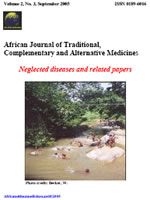
|
African Journal of Traditional, Complementary and Alternative Medicines
African Ethnomedicines Network
ISSN: 0189-6016
Vol. 4, Num. 4, 2007, pp. 382
|
African Journal of Traditional, Complimentary and Alternative Medicines, Vol.4,
No. 4, 2007, pg. 382
Editorial
POVERTY AND DEVELOPMENT IN AFRICA: MORE ACTION IS REQUIRED
FROM STAKEHOLDERS
Clement O. Adewunmi and John A. O. Ojewole*
Drug Research and Production Unit, Faculty of Pharmacy, Obafemi Awolowo University,
Ile-Ife, Nigeria, and *Department of Pharmacology, Faculty of Health Sciences,
University of KwaZulu-Natal, Private Bag X54001, Durban 4000, South Africa
E-Mail: editor@africanethnomedicines.net
Code Number: tc07075
The anatomy and physiology of poverty are very complicated. Also complicated
is the therapy of poverty. Many of the problems in Nigeria (including greed,
avarice, election rigging, armed robbery, diseases, etc) are associated with
poverty. Driving through the cities of many African, parts of Asian and South
American countries, one could clearly feel poverty, hunger and poverty-related
diseases. Unfortunately, however, the poor people are used to seeing abject
poverty face-to-face. This may be because they have resigned themselves to
the overwhelming burden of poverty, or because of lack of aggressive actions
by governments to reduce poverty. In many developing countries, some of the
poverty-alleviating programmes have been seemingly geared towards enriching
the pockets of relatives and cronies of some officials of governments and agencies.
AJTCAM, therefore, supports the efforts of the Committee of Science Editors
and the World Association of Medical Editors in creating awareness regarding
the call for global efforts to reduce, if not eradicate, poverty. Governments
should empower their citizens by providing qualitative education and vocational
training programmes which would make it easier for the populace to create and
find suitable jobs. Governments should also encourage development of good farming
systems that would make it possible for poor nations to feed themselves and
improve their healthcare delivery system by investing in alternative medicines
and training of herbalists. Equitable trading policies should be instituted
by the world's richest nations with the less fortunate ones. AJTCAM's solidarity
is with these sentiments. The journal is, therefore, devoting its October 2007
Issue to this worthy course , and calling for global support to reduce poverty
by publishing some papers in this issue. The journal is particularly happy
to accommodate the following papers in this issue: F. E. Ogbimi (2007). Promoting
sustainable economic growth and industrialisation: solution to mass unemployment
and poverty - Afr. J. Trad. CAM 4(4):541-552; Omotoye Olorode (2007), Biodiversity,
globalisation and poverty. -Afr. J. Trad. CAM 4(4):532-540; Dokun Oyeshola
(2007), Development and poverty: a symbiotic relationship and its implication
in Africa -Afr. J. Trad. CAM 4(4):553-558 and also publication of papers relevant
to AJTCAM's focus and scope.
© Copyright 2007 - African Journal of Traditional, Complementary and Alternative
Medicines
|
